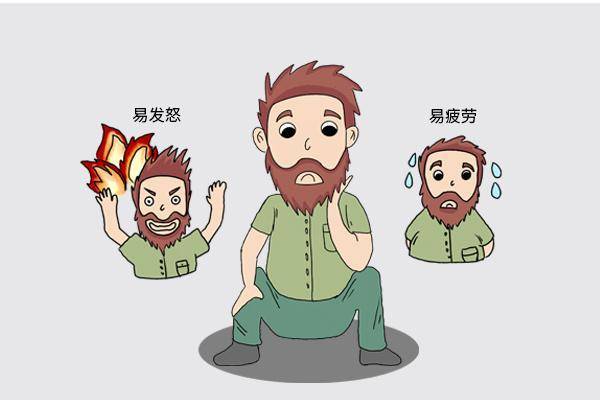When a man reaches forty, his kidney qi weakens, and he starts to age. In ancient times, forty was considered the dividing point between young and middle-aged men. At the age of forty, the levels of male hormones in a man’s body significantly decrease. Just as women go through menopause, men over forty also experience physiological changes due to the decrease in male hormones.
With sufficient male hormones, men appear healthy and energetic, but when male hormones are insufficient, they lose their masculine traits, and it becomes challenging to maintain a healthy body. So, what are the specific characteristics of men with low male hormones?
Slow and sparse beard growth
Every hair on a man’s body is related to the levels of male hormones. When male hormones are abundant, beards grow quickly and appear thick, making men look attractive. However, when male hormones decrease, hair growth is limited, and the beard doesn’t grow quickly. As men age, they shave less frequently, which is a typical sign of this.
Besides the beard, the same applies to head hair, leg hair, armpit hair, etc. As the level of male hormones decreases, these hairs not only grow slowly but also tend to fall out. Men start facing the trouble of hair loss as they enter middle age, and this is related to the low levels of male hormones.
Unstable mental state, limbs feeling weak
A man’s mental well-being is also linked to the levels of male hormones. Male hormones regulate the body’s energy balance, facilitate the release of substances, and play a role in nutrient absorption. With low levels of male hormones, these functions cannot be effectively fulfilled, leading to a feeling of physical weakness and lack of energy.
Due to the lack of strength and limited energy supply, men naturally experience poor mental states. Many men in middle age also become moody, suspicious, and increasingly irrational. These emotional changes are associated with the decrease in male hormones, and men around the age of forty should pay attention to these mental changes.
Potbellied and oily-faced
The term “greasy uncle” initially refers to chubby men around forty, where greasy refers to fat. As men reach forty, without active exercise, weight gain becomes unavoidable. The reason is the low level of male hormones, which cannot balance the body’s fat content, coupled with substantial muscle loss, resulting in a protruding belly.
As male hormones further decrease, normal fat secretion also becomes impaired. Excessive oil will be secreted through the skin, causing the man’s face to appear oily and disrupting normal metabolism. Excessive oil secretion will be noticeable on the face, back, and hair.
Men with low male hormones can regulate them through dietary supplements by consuming foods rich in cholesterol, zinc, and high calcium content. These three types of food help enhance male body functions and increase male hormone levels effectively. Cholesterol promotes hormone synthesis and secretion, zinc is a raw material for hormone synthesis, and calcium deficiency can lead to decreased male hormone levels. Supplementing calcium can prevent osteoporosis caused by low male hormone levels.
For cholesterol supplementation, men can choose eggs and lean meat, which can regulate hormone secretion and provide protein. Foods high in zinc include oysters, mussels, beef, and lamb. There are various high-calcium foods such as lobsters, seafood, sesame seeds, and milk. Men should learn to balance these foods to ensure a balanced intake of nutrients without overdoing supplementation.
Everyone has their own worries – just as women go through menopause, men also experience physiological changes due to decreasing male hormones. It is essential to pay attention to any abnormal changes in the body, assess whether hormone levels are adequate, and if male hormone levels are low, they should be replenished promptly to prevent losing their masculine vigor.


